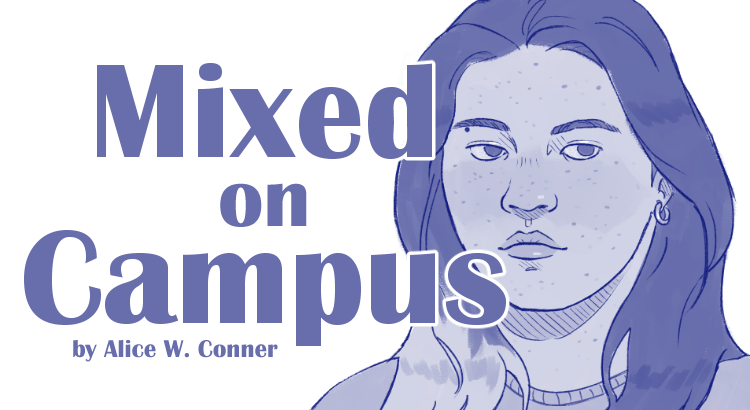
Name: Sophia Davis
Mix: Khmer & White-American
Major & Year: Astronomy & Astrophysics; Junior
Q: How has being mixed affected your campus experience?
A: It’s a bit of a bittersweet thing. I grew up in the Memphis metro area where there is a pretty decently sized Khmer community. My only issue was that I did not see a lot of Asian people in general in high school and in my day to day life. I come to Michigan, and I have met not only more Asian people but mixed people as well that understand the uniqueness of coming from a mixed background. While I have been happy to meet people that I can relate to and understand what it means to mixed, I have met very, very few people that are Khmer. It has been hard keeping connected to my culture when I’m so far away from my hometown, and I don’t see my family as often. It was a bit isolating at first, but it’s been more of push to go out of my way to stay involved in my culture.
Q: What do you wish more people knew about the mixed experience?
A: I wish more people understood that it is my choice how I identify and present myself. I grew up in a conservative southern town where I never quite fit the mold. With my dad being white and my mom being Khmer, I was born into a dichotomous cultural upbringing. I was either “too Asian” or “not Asian enough” just depending on who was making the judgment. I did not feel like I had a sense of community as I had no one to relate to identity-wise. Yes, there was my everloving mom, but how could I manage to look at the woman that gave me life and tell her I was ashamed of the gift she gave me? Yes, there was my younger brother, but how could I place this burden of thought upon someone I am supposed to uplift and inspire? It became such an omnipresent issue that it even began to translate and present itself in other aspects of my life such as academia. There were cultural expectations to succeed and never fail because the work I put in is a direct reflection of my family. There were societal expectations such as the “Model Minority” that negatively reinforced damaging stereotypes. For me, these standards often clashed with each other, creating my toxified perspective on education and school. I wanted to be the best because I felt as if that was what was expected of me by everyone. There was also nothing worse than putting countless hours of work and effort into a project only for the praise to be followed by “because she’s Asian!” Coming to Michigan has transformed my racial imposter syndrome. It was oddly cathartic to see so many multiracial people that understood the exact emotions and situations that I had also experienced. I loved being able to talk through it. We learned from each other, listened to each other, and continue to help uplift each other. I still struggle with it, but I am learning as I go. It is more than okay to love all of myself while recognizing the privilege and struggle in my identity. How I define myself is not based on anyone’s expectations or preconceived notions whether that be family, friend, or stranger. I am not meant to be told what I am; I tell others about myself.
Mixed on Campus was inspired by the Humans of New York project. The purpose of Mixed on Campus is to give a voice to this university’s mixed community and shed light on its members. Being mixed means to be multiracial, multiethnic, and/or a transnational adoptee. Through Mixed on Campus, mixed students have the opportunity to have their portrait drawn and share their experiences!



Leave a Reply
Be the First to Comment!